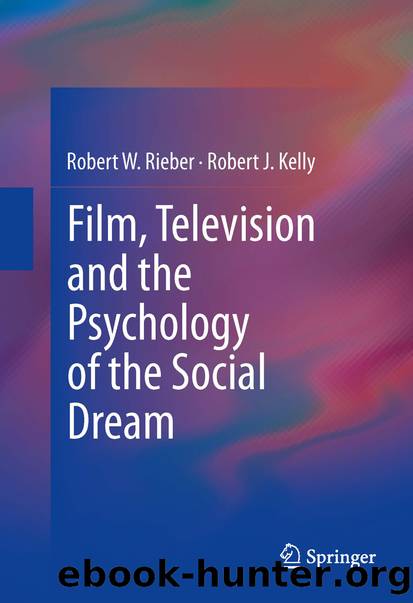Film, Television and the Psychology of the Social Dream by Robert W. Rieber & Robert J. Kelly

Author:Robert W. Rieber & Robert J. Kelly
Language: eng
Format: epub
Publisher: Springer New York, New York, NY
Apocalyptic Change and Cinema
Why do superheroes like Bond, Bourne, and Ethan Hawke arise in the creative psyche and infuse themselves into the popular cultureâs artistic productions? Are Bond and company, characters peculiar to the West? Or, are they more generally, symptomatic of the imagery that suffuses a sophisticated technological culture struggling through stages of change?
Apocalyptic movements have been the motors and driving forces of religious, political, and economic change throughout history (Mannheim 1938; Kelly 1972). Perhaps the great cinematic epics of the past with oblique political overtones such as The Seven Samurai (1959), Captain Blood (1939), Robin Hood (1938), Potemkin are indicative of such trends. Before cinematic technology acquired the technological refinements it now possesses, comic books (action books that featured Batman, Superman, Capt. Marvel, Plastic Man, etc.) which were adventures against criminals and evil doers in a context of astounding action fraught with danger at virtually every turn. Across a broader historical canvas, the record suggests that Christian origins are inseparable from the spirit or apocalyptic that consumed the Judeo-Hellenistic world in late antiquity. Muhammadâs early mission cannot be explained without reference to the apocalyptic admonitions, the foreseen calamities, and the terror of the Day of Judgment apparent in the early suras (chapters) of the Koran (Amanat 2008). Movies found these texts and transformed them into brilliant scripts. For example, a variation on this theme of the âdeliverer,â the Mahdi or Twelfth Imam, revered by Shiite Muslims, was evident in the Iranian Revolution when the Ayatollah Khomeini who mobilized disparate Iranians and demonized perceived enemies in a world where the people of Godâthe saved remnant of humanityâsee themselves as the sole bearers of divine wisdom and knowledge. The utopian project of realizing paradise may be as devastating as the earthquakes, plagues, and wars of apocalyptic imaginings.
Khomeini appropriated the role of the Mahdi to himselfâthough shrewdly not claiming openly divine inspiration and infallibility. He shook the traditions of shiâ ism to its foundations by taking power so spectacularly (Takeyh 2009).
In Bond films 007 confronts a lunatic mastermind prepared to destroy or subdue the world through catastrophic violence and fierce intimidation. These themes of violent ends, apocalypse, lay at the heart of some of the most important European literature in the pre-World War II periodâa time incidentally when Ian Fleming (the author of James Bond Stories) and John Le Carre (the author of Tinker Tailor Soldier Spy and The Spy Who Came in from the Cold) were beginning careers in government agencies involved in intelligence and espionage.
In Robert Musilâs A Man Without Qualities (1942), a literary masterpiece about the collapse of the Hapsburg Empire in the World War I era, Ulrich, the hero of the novel becomes disillusioned and ambivalent as the Austro-Hungarian system begins to unravel. Ulrich, like Bond and Bourne depends on the external, ephemeral world to form his character. He exhibits keen analytical capacities but is also given to passive aggressiveness. His protagonists are the feckless bureaucrats, army officers, nobles, groveling, bourgeois entrepreneurs, and Moss burger (aka âJawsâ in the Fleming/Broccoli reincarnations on the screen.
Download
This site does not store any files on its server. We only index and link to content provided by other sites. Please contact the content providers to delete copyright contents if any and email us, we'll remove relevant links or contents immediately.
Call Me by Your Name by André Aciman(20501)
Ready Player One by Cline Ernest(14645)
How to Be a Bawse: A Guide to Conquering Life by Lilly Singh(7472)
Wiseguy by Nicholas Pileggi(5770)
The Kite Runner by Khaled Hosseini(5170)
On Writing A Memoir of the Craft by Stephen King(4936)
Audition by Ryu Murakami(4923)
The Crown by Robert Lacey(4807)
Call me by your name by Andre Aciman(4676)
Gerald's Game by Stephen King(4642)
Harry Potter and the Cursed Child: The Journey by Harry Potter Theatrical Productions(4503)
Dialogue by Robert McKee(4389)
The Perils of Being Moderately Famous by Soha Ali Khan(4217)
Dynamic Alignment Through Imagery by Eric Franklin(4208)
Apollo 8 by Jeffrey Kluger(3705)
The Inner Game of Tennis by W. Timothy Gallwey(3680)
Seriously... I'm Kidding by Ellen DeGeneres(3629)
How to be Champion: My Autobiography by Sarah Millican(3590)
Darker by E L James(3512)
